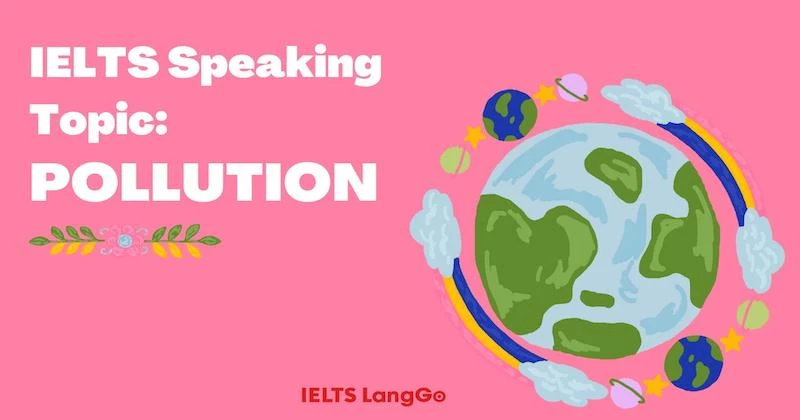


“Pollution” là một trong những chủ đề phổ biến và thường gặp nhất trong IELTS. Tại chuyên đề này IELTS LangGo sẽ hướng dẫn giải đề Pollution IELTS Speaking Part 1, 2, 3 chi tiết nhất cùng bộ từ vựng đi kèm. Hãy follow bài viết để có thể ăn trọn điểm Speaking topic Pollution nhé.
Pollution (Sự ô nhiễm) là một chủ đề rất rộng, bao gồm nhiều chủ đề nhỏ xung quanh nó. Trong bài viết này, IELTS LangGo sẽ giải đề cùng bạn với các đề mẫu dưới đây.
Q1: Do you think pollution is a big problem nowadays?
Yes, definitely. Pollution is a major issue in today’s world. Pollution is a major contributor to a wide range of health and environmental issues, including climate change, air pollution, water contamination and land degradation. It is critical that we act now to reduce pollution and protect the environment.
Q2: What are the common types of pollution in your country?
The most common types of pollution in my country are air pollution, water pollution and land pollution. Air pollution is caused by the burning of fossil fuels and the release of harmful gases into the air. Water pollution is caused by the release of chemicals from the factories and farms, sewage and other contaminants into water sources. When chemicals and things are dumped on land, they contaminate the soil.

Q3: Has there been an increase in pollution where you live?
Yes, unfortunately, pollution has increased in my area over the last few years. This is due to an increase in the number of vehicles on the road as well as the expansion of industry in the area. It is critical that we take steps to reduce pollution in our community and protect the environment.
Q4: What should we do to protect the environment?
We should do our part to protect the environment by using less resources, making less trash, and using more sustainable materials. We should also look for ways to reduce our footprint, such as by riding our bikes or walking instead of driving and installing energy-efficient appliances in our homes
Part 2: Describe a place you visited that has been affected by pollution.
You should say:
And explain how this place was affected.
Sample Answer 1:
My answer revolves around a very famous tourist attraction in my hometown, Do Son, of which the beach has long been fraught with litter.
When I still lived in Hai Phong, I usually travelled to Do Son every summer, due to its short travelling distance. In 2015, my last visit of that routine, I went swimming with my dad before going onland to enjoy the seafood. This was when the experience got worse. The water was dull and had this weird brown colour. I could not see any tiny stones that made up the seabed. That meant the water was contaminated and therefore not suitable for long-term skin exposure. Moreover, human trash and even dead sea creatures were also common sights - in my case, jellyfish. We left the beach 10 minutes after witnessing the scene.
I thought about the reasons for this polluted scenery during our lunch. It boiled down to two popular reasons: the massive number of visitors enjoying the cool water at the same time and poor human behaviour. I haven’t returned to Do Son to swim ever since, but I hope this situation has been well handled by the authority, to return it into the purest state for future generations to enjoy.
(IELTS LangGo)
Vocab:

Sample Answer 2:
I guess nowadays, we don’t need to go far to find vivid examples of polluted places, because pollution is a modern plague in our society. I’d like to tell you about a heavily contaminated branch of the river that runs through my neighbourhood on the outskirts of Hanoi. If I'm not mistaken, the river is called Kim Ngưu, which is literally translated as “Golden Buffalo” in English. During my childhood, I heard a lot of stories from my grandparents about how crystal clear the river used to be. It was so clean that nearby residents used this water for daily uses like irrigating crops, cooking and washing clothes. Children could even swim there as a way of unwinding after school. However, over the last 50 years, when Hanoi has gradually become a densely populated mega city, this river has been heavily polluted by dwellers activities. Im properly disposed waste products from industrial zones nearby and untreated domestic wastewater are directly discharged from sewers into the river. The inhabitants living along the banks of the river also garbage dump making the situation even worse. I remember first time seeing the river when I was 5 years old. I was totally freaked out because of the terrible smell of rotten garbage and chemicals. The river now looks like a slow flowing sewer and dump ground for household garbage, which is the void of life. I hope the City Council could take measures to clean up the river as soon as possible.
(IELTS LangGo)
Vocab:

In what ways can air pollution be reduced effectively?
To alleviate this environmental problem, I guess there are several measures that both individuals and the authorities should take. On a personal level, each person can ride bikes to work or use public transit to reduce greenhouse gases emissions. Or they can plant a lot of trees to cool the neighbourhood, or to combat climate change and clean the air. In terms of the government's responsibilities, I guess they can impose a blanket ban on the vehicles that are substandard and release tons of exhaust fumes into the air.
What are the differences between people living in the clean air and others?
From my own observations, there are two fundamental differences. First is health. Obviously, people living in clean air will have less probabilities to develop respiratory problems - such as tuberculosis, or even lung cancer, which is very popular among old people or heavy smokers. Aside from those health benefits, I think transportation also benefits from having a clean atmosphere, an atmosphere without smog or low visibility. It allows people to commute more safely and more quickly, without the fear of bumping into each other under hazardous weather.

Why are there places that have polluted air and places that don’t?
I guess there are a number of reasons that contribute to the level of pollution in certain places. The first reason is population growth. To be more specific, urban areas are always subjected to more severe air pollution than rural ones - as cities have to accommodate a large number of residents, which also means the environment here has to tolerate more greenhouse gases, toxic industrial discharge and domestic sewage. The second reason I can think of is the rate of tree coverage. For example, the countryside is often covered in a lot of trees and plants that aid in the process of air filtration, while the lack of green space in the cities causes the air to be less fresh and breathable.
Do you agree with the statement that companies will only protect the environment if they are forced?
This only applies to small businesses and companies, of which their financial prowess doesn't allow them to think much about external forces, apart from how to reduce the production cost as much as possible. These companies do have to rely heavily on environments and other natural sources, in order to draw cost advantages. But for long established, successful and bigger enterprises, apart from being legislated by the law to protect their surroundings, they also bear and should feel the need to execute these steps on their own. In economy, there’s a term called corporate social responsibility (CSR), and there are so many big companies utilising these initiatives in order to spread the positive image whether it's voluntary or not. Using money in order to to bring a positive image to the community, for greater awareness and appreciation, as well as recruiting many people in the process of countering hazardous effects caused by their own procedures - I think it’s very cool and should be applied on a larger scale, whenever the company has the possibility to do.
Trên đây là bài mẫu và từ vựng IELTS cho phần thi Speaking chủ đề Pollution Part 1, 2, 3 LangGo gơi ý cho bạn. Để có thể hoàn thành phần thi Speaking một cách tốt nhất, trước tiên bạn cần biết rõ trình độ hiện tại của bản thân và dần dần cải thiện nó.
Điền phiếu thông tin dưới đây và nhận cơ hội tham gia test miễn phí 4 kỹ năng tại IELTS LangGo. Đặc biệt, riêng kỹ năng Speaking sẽ được thực hành test 1:1 với tester cao cấp tại IELTS LangGo. Đừng bỏ lỡ cơ hội này nhé!



ĐẶT LỊCH TƯ VẤN MIỄN PHÍ LỘ TRÌNH Săn ƯU ĐÃI lên tới 12.000.000đ